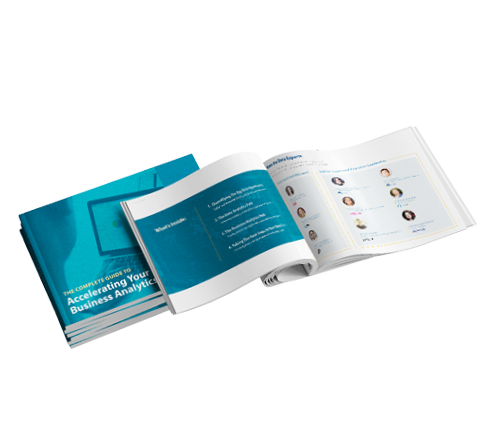Request Information
We're Sorry
There was an unexpected error with the form (your web browser was unable to retrieve some required data from our servers). This kind of error may occur if you have temporarily lost your internet connection. If you're able to verify that your internet connection is stable and the error persists, the Franklin University Help Desk is available to assist you at helpdesk@franklin.edu, 614.947.6682 (local), or 1.866.435.7006 (toll free).
Just a moment while we process your submission.

What is a Business Analytics Master’s Degree? 5 Common Questions Answered
Demand for business analytics professionals is on the rise now that companies of all sectors—not just those dubbed specifically as tech companies—are in need of data-savvy employees. This creates an unprecedented moment for business professionals to upgrade their skills and take advantage of new high-growth opportunities.
A master’s degree in business analytics can be an effective way to differentiate yourself in a competitive job market while equipping you with essential skills to succeed. Let’s dive in and answer some of your most pressing questions about this degree so you can determine if it’s the right fit for you.
What Do Students in a Business Analytics Master’s Program Typically Study?
The curriculum of a business analytics master’s degree program is designed to align with the most sought-after skills in the business analytics field today.

Throughout your degree program, you can expect to learn foundational analytic skills and industry-standard tools and techniques—while applying those through the lens of everyday business challenges. You can expect to cover topics such as:
- Statistical Methods: Use statistical inference methods and industry-standard software to inform decision-making.
- Database Management: Evaluate fundamental database design considerations, as well as in-depth analysis of the algorithms and machine organizations.
- Data Mining: Explore different data mining methods and tools, focusing on the analysis of massive and unstructured datasets.
- Data Visualization: Collect, prepare and analyze data to create visualizations, dashboards and stories that are used to communicate critical business insights.
- Marketing Analytics: Use marketing analytics tools to analyze market data in order to make data-driven decisions and gain valuable customer insights.
- Financial Modeling: Dive into the theory, strategy and practice of financial management while emphasizing computer-based modeling and forecasting.
This technical knowledge translates directly into industry-ready skills that will benefit professionals in a variety of roles and industries.
Get a FREE roadmap that includes insider information to help you maximize the many opportunities in the fast-growing field of Big Data.
What Career Skills Do You Learn in a Business Analytics Master’s Program?
A master’s degree in business analytics provides career skills that combine both technical proficiency and interpersonal expertise to create the type of well-rounded professionals companies are looking for.
Professionals with an M.S. in Business Analytics are prepared to:
- Identify business market trends, risks and opportunities to enable data-driven business strategies.
- Present data in compelling ways to inform or persuade business decisions.
- Evaluate ethical data usage in the process of business decision-making.
- Articulate analyses and interpretations of data to both technical and non-technical audiences.
- Forecast financial performance using predictive analytics to help leadership adjust operations to meet goals.
Is a Master’s in Business Analytics a Good Degree?
The rising demand for business analytics professionals makes an investment in a master’s degree a good choice for data-savvy professionals.

A master’s degree in business analytics is especially beneficial because professionals can quickly build the technical skills to succeed in this field. For example, Franklin University’s M.S. in Business Analytics includes a built-in graduate certificate that formally documents a professional’s ability to identify and communicate insights gained through data analysis. The Graduate Certificate in Data Analytics is awarded after the completion of the first four master’s courses, putting a student’s time and money to work quickly.
Upon completion of a master’s degree program, professionals can expect to reap the benefits of new leadership opportunities, increased salary expectations and long-term career mobility.
How Long Does It Take To Earn A Master’s in Business Analytics?
A master’s degree in business analytics can be completed in as few as 12 months. Time to completion will vary based on criteria such as the program you choose, your time commitment and if you qualify for transfer credit.
You can accelerate earning your degree by choosing a university with a(n):
- Online M.S. in Business Analytics program: Online programs typically work on a rolling admission cycle and courses can be completed in as few as 6 weeks. You can also complete coursework around your schedule, which provides the flexibility working professionals need to complete a degree quickly.
- Generous transfer credit policy: For professionals who have previously completed master’s-level coursework, earned professional credentials or have extensive professional experience, transfer credit may offer the opportunity to reduce time and expense. Franklin University offers up to 12 hours of transfer credit at the master’s degree level and one-on-one transfer credit support to help students determine their eligibility.
- Strong student support and advising services: Student support is a critical element of success, especially for working professionals pursuing a degree. Look for universities that offer dedicated academic advisors, as well as library, writing and academic support services.
Who Should Pursue a Master’s Degree in Business Analytics?
Whether you should pursue a master’s degree in business analytics is a highly personal choice. You need to make sure that this degree aligns with your personal desires and professional goals. In addition to technical knowledge and skills, success in business analytics is also determined by characteristics such as:
- A curious and inquisitive nature
- Critical thinking and decision-making abilities
- Concise and persuasive communication skills
- An appetite for lifelong learning
If these qualities align with your working style, a master’s degree in business analytics is a good choice if you want to influence business decisions at the highest levels of an organization. This includes competitive career opportunities in areas such as:
- Business consulting work—whether independently or for large consultancy firms.
- Startup leadership, including refining a startup’s offering, products and services in a competitive environment.
- Highly data-driven fields such as technology, finance or supply chain and logistics.
Invest in Your Future with a Master’s Degree in Business Analytics
A master’s degree in business analytics is an investment in long-term job stability, salary and competitiveness in the job market.
Franklin University’s M.S. in Business Analytics can help you transform data into insights that create a competitive advantage for your organization. Franklin’s curriculum is designed by experienced professionals and uses industry-leading tools to build your skills in this fast-growing industry.
Franklin’s master’s in business analytics degree can be completed in as few as 12 months, putting you on the fast-track to advancing your career. Learn more about this degree and the advantages it provides working professionals looking to get ahead.





